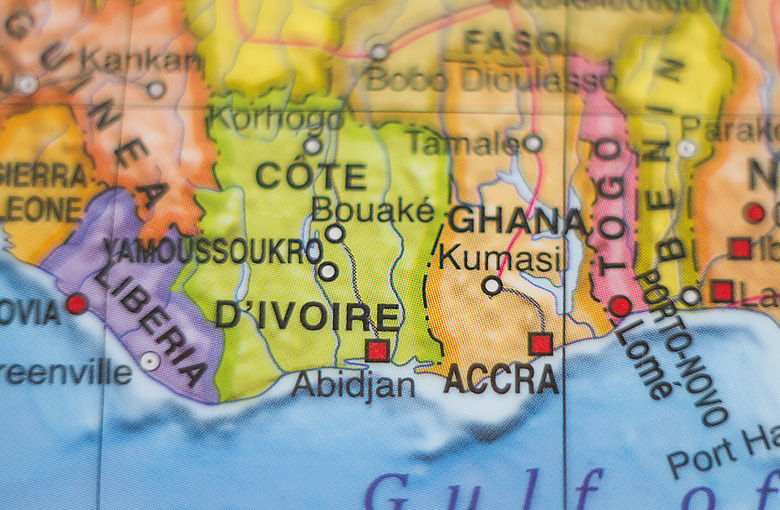
News update: Ways to lead
The leadership of the top-10 ranked Department of Information Systems takes many forms. Professor Ajay Vinze, in his role as ASU’s associate vice provost for graduate education, was instrumental in creating a program that will help an African nation build its economy. And one of our first-year doctoral students drove home the first prize in a university-wide competition with her research on Uber Technologies Inc.
The leadership of the top-10 ranked Department of Information Systems takes many forms. Professor Ajay Vinze, in his role as ASU’s associate vice provost for graduate education, was instrumental in creating a program that will help an African nation build its economy. And one of our first-year doctoral students drove home the first prize in a university-wide competition with her research on Uber Technologies Inc.
MasterCard Foundation funds partnership with university in Ghana

Professor of Information Systems Ajay Vinze, in his role as ASU’s associate vice provost for graduate education, was part of a team that has forged a partnership between ASU and Kwame Nkrumah University of Science and Technology (KNUST) in Ghana. The program, with $21.9 million from the MasterCard Foundation (MCF), will deliver master’s level education to students from that country. “An international accelerated degree program model (3+1+1) allowing select international partner institutions of ASU to have a curricular/programmatic connect with leading ASU programs in business and engineering were at the heart of this proposal,” said Vinze, who was a co-principal investigator with Aryn Baxter, director of the MasterCard Foundation Scholars Program at ASU, and Jacqueline Smith, assistant vice president and executive director of ASU’s Office University Initiatives.
“This is a proud moment for ASU: this generous grant from MCF allows ASU to leverage innovations on the international front,” Vinze said. “Through this grant and with a strong partnership with KNUST, the W. P. Carey School of Business and the Fulton Schools of Engineering will be building critical capacities for Ghana — this will undoubtedly have a much broader impact in the region and beyond.” Vinze said that the grant contributes on several fronts. “It will provide Ghana and the broader African context with professionals that will be equipped with ASU education in key areas that are driving the global economy — business analytics, global logistics, biomedical engineering and mechanical engineering,” he explained. “Additionally the grant provides the basis for leveraging ASU talents in education research to help train the trainers in Ghana,” Vinze said. “This effort facilitated by MCF will undoubtedly have a multiplier effect.” The partnership, called Strengthening Institutional Linkages, will enable 150 Ghanaian scholars to complete accelerated master’s degrees in business and engineering through the 3+1+1 program model.
The 3+1+1 model includes three years of undergraduate education in Africa. A fourth-year undergraduate experience at ASU completes the undergraduate degree awarded by the student’s undergraduate institution, and prepares him for successful engagement in an accelerated master’s degree awarded by ASU. Some of the students are expected to enroll in W. P. Carey’s Master of Science in Business Analytics and Master of Science in Global Logistics programs. Over the course of the program, a total of 42 faculty members from the African partner institutions will also receive professional development training to serve as scholar mentors, collaborate with scholars and their faculty members at ASU on research projects in Africa and extend their learning to their home institutions.
IS doctoral student wins competition

Ziru Li, a first year doctoral student in the Department of Information Systems, won first place in the Graduate Student Poster Competition, hosted by the Institute for Social Science Research at ASU. Ziru’s research-in-progress examines how the entry of ride sharing services such as Uber drive traffic congestion in metro areas. Other members of the research team include Associate Professor Zhongju Zhang and Assistant Professor Kevin Hong. Academic posters display a brief summary of a research project, using tables, graphs, charts, pictures and other presentation formats to engage visually. Widely used in the academic community, the poster is one of the most common methods of disseminating scientific information at conferences, as authors discuss the work with viewers.
Li explained that her project probes the sharing economy, which uses information technology to re-distribute unused or underutilized assets to people who are willing to pay for the services. “Its new, creative business model has disrupted many traditional industries (e.g., transportation, hotel) by fundamentally changing the mechanism of demand and supply,” she said. “We plan to investigate how Uber, a peer-to-peer platform providing ride-sharing services, influences traffic congestion and carbon dioxide emissions. We will further study how ride-sharing services such as Uber can change the driving behaviors of individuals, thus shifting demand and supply in the market.”
Latest news
- Revamped teaching method captures attention of students
How I-MAC 2.0 turns leadership theory into interactive, high-impact learning.
- Flexible ASU Evening MBA helped Layla Gabir build new confidence, connections, and career momentum
Layla Gabir (Evening MBA '26) works full-time as an epidemiologist for Maricopa County and…
- Computer information systems student Andrew Patel balances school with full-time work, earning stockbroker certification
Andrew Patel (BS Computer Information Systems '26) was looking for a program that combined…